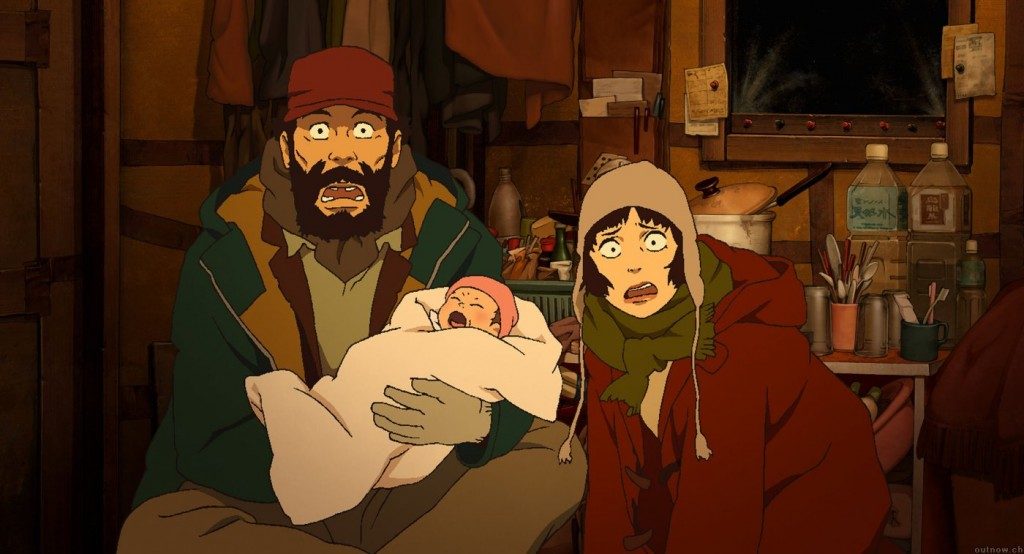
‘Tokyo Godfathers’ review
By Adam Tatelman, Staff Writer
4/5
I guess I can officially call myself a Satoshi Kon fan, considering I’ve reviewed three of his four films in as many weeks.
Kon’s third film, Tokyo Godfathers, is an odd little duck. The plot is based on the John Wayne classic Three Godfathers, casting the trio of bandits instead as desperate street people. Gin, a depressed alcoholic; Miyuki, a teenage runaway; and Hana, a transsexual drag queen; happen upon a baby abandoned in a dumpster on Christmas Eve of all nights. Forced into the roles of surrogate father, mother, and sister, the three decide to locate the baby’s parents.
Taking place from Christmas Eve to the end of Christmas Day, the film explores the strained relationship between the three bums as they dodge street punks, Yakuza hitmen, and unpayable hospital bills. In the process, each of the three is given a chance to confront the past mistakes that landed them on the streets. The one thing that unites them as a dysfunctional surrogate family is their social rejection, but it’s shown that each of them has, in a sense, made themselves outcasts, and still has the chance to be accepted back into the world.
In another unique twist, the film features both Western and Eastern religious iconography. The three hobos and the abandoned child are an obvious reference to the virgin birth and the three wise men, and the baby’s forehead has a mole resembling Gautama Buddha’s. The opening act even parallels the minority population of Japanese Christians with the majority public who celebrate a secular version of Christmas.
Hana falls into the former category, believing that God sent her to protect the child. Amusingly, the film is packed full of strange coincidences that may or may not be divine providence. These chance meetings and near misses may seem convenient, but that’s the point: like in The Blues Brothers, we’re left to decide if the trio are really on a mission from God or just incredibly lucky. It’s mostly used as a comedic device to call attention to the ongoing identity crisis of the Christmas holiday itself, both a secular institution and a religious tradition.
Since this is a Christmas movie, there is a happy ending. But after watching the beleaguered bums constantly go out of their way to help other unfortunates, it feels earned. The characters had to grow in order to reach the finale, and that’s exactly what keeps this film from feeling like holiday treacle. It is brave enough to show the conditions many suffer on the supposed happiest day of the year, yet it never wallows in despair. The real Christmas spirit of the show is its optimism in the darkest of times.
Once again Kon manages to highlight the importance of animation to the ongoing cultural dialogue between Japan and North America. It’s a common ground upon which to discuss all the philosophical ideas that intrigue our respective cultures. Seeing another culture’s perspective on a familiar tradition is a novel idea, making for thought-provoking holiday entertainment with an affecting dramatic centre.
If you’re tired of watching reruns of A Christmas Story and It’s a Wonderful Life, then Tokyo Godfathers may be the Christmas film you’re searching for.

